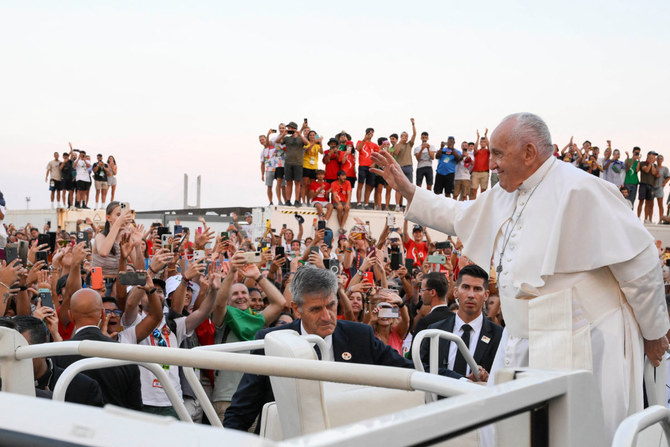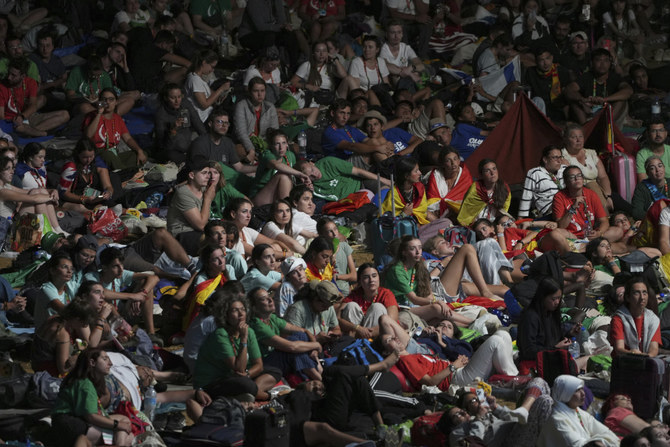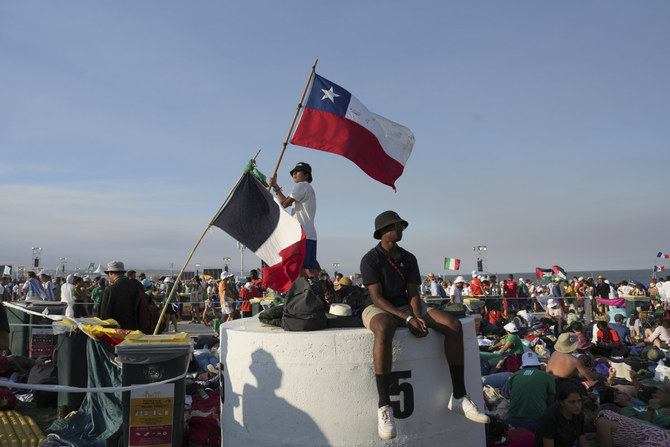LISBON, Portugal: An estimated 1.5 million young people filled a field in the Portuguese capital Lisbon on Saturday for Pope Francis’ World Youth Day vigil, braving scorching heat to secure a spot for the evening prayer and to camp out overnight for his final farewell Mass on Sunday morning.
Francis made only brief remarks before them, however, and ditched his prepared speech for the fourth time in two days. Instead, the 86-year-old pontiff delivered a lively, 10-minute off-the-cuff chat in his native Spanish about journeying together and helping one another. “No fear, thanks, ciao!” he said at the end before aides pushed him in his wheelchair to the side of the stage.
Temperatures had soared to 38 Celsius (95 Fahrenheit) on Saturday in Lisbon and were forecast to top 40 C (104 F) on Sunday. The heat forced pilgrims to shelter under umbrellas and makeshift shades of plastic canvas sheets tied between trash bins in the otherwise exposed field on the edge of the River Tagus.
Crews blew misters at the pilgrims to try to cool them down as they made their way into the venue at the peak of the day’s heat, many flying their national flags. They formed long lines to fill water bottles from what organizers said were more than 400 faucets around the field.
Smoke from a spate of wildfires that broke out around Portugal during a weekend spike in temperatures cast a haze over the sky as they arrived on foot from all around the city for one of the liturgical highlights of the Catholic youth festival. Citing local organizers, the Vatican said an estimated 1.5 million people were on hand.
Lan Young Modesta Cheong, a pilgrim from South Korea, said the heat was bad but her group made use of the trash bins to create shade.
“At first we were not so comfortable with it because is dirty and it maybe smelly but at a certain point it became our tent, it’s kind of a miracle and for me it is a bit the spirit of World Youth Day,” she said. “We started using a useless dirty thing to support us and use it to avoid the heat and all these difficulties.”
Francis presided over the evening vigil after spending the morning at the Catholic shrine in Fatima.
There, he ditched his prepared speech and a prayer for peace. The prayer had been expected to be a highlight of Francis’ visit to Fatima, given the shrine’s century-old affiliation with exhortations of peace and conversion in Russia and the ongoing war in Ukraine.
Francis instead “prayed silently for peace, with pain,” while meditating for a long period before a statue of the Virgin Mary, Vatican spokesman Matteo Bruni said. And the Vatican later posted the prayer on the platform X, formerly known as Twitter.
An estimated 200,000 turned out for Francis’ visit to Fatima, packing the central esplanade long before the red-tinted moon set and the sun rose. Nearby wildfires turned the sky smoky black and sent ash snowing down on the crowd.
“We are here with great joy,” said Maria Florido, a 24-year-old Spaniard who also saw Francis in Lisbon. “We woke up very early to come here and see the pope ... and we’re here with great enthusiasm.”
The Fatima story dates back to 1917, when according to tradition, Portuguese siblings Francisco and Jacinta Marto and their cousin Lucia said the Virgin Mary appeared to them six times and confided to them three secrets. The first two described an apocalyptic image of hell, foretold the end of World War I and the start of World War II, and portended the rise and fall of Soviet communism.
In 2000, the Vatican disclosed the long-awaited third secret, describing it as foretelling the May 13, 1981, assassination attempt against St. John Paul II in St. Peter’s Square, which fell on the anniversary of the original vision.
According to later writings by Lucia, who became a nun and died in 2005, Russia would be converted and peace would reign if the pope and all the bishops of the world consecrated Russia to the “Immaculate Heart of Mary.” Lucia later claimed that John Paul fulfilled that prophecy during a 1984 Mass, even though he never specified Russia in the prayer.
Vatican Media had said before the trip that Francis would pray for peace in Ukraine and the world while in Fatima. It seemed logical, given Francis had already consecrated both Russia and Ukraine to Mary in a prayer for peace following Russia’s invasion of Ukraine, essentially fulfilling Sr. Lucia’s exhortation.
In the prayer posted on the platform X by the @Pontifex account but not read aloud, Francis didn’t name either country but consecrated the church and world, “especially those countries at war,” to Mary. “Open paths where it seems that none exist,” he wrote. “Loosen the tangles of self-centeredness and the snares of power.”
Fatima Bishop Jose Ornelas made a prayer for Ukraine explicit in his remarks. “We associate ourselves to Your Holiness’ prayer for peace, for which this sanctuary is profoundly identified, thinking in particular of the war in Ukraine and so many other conflicts in the world,” he said.
In explaining the changes, Vatican spokesman Bruni said Francis “always addresses firstly the people he meets, as a shepherd, and speaks accordingly.” Francis often deviates from his prepared remarks, even more when speaking in his native Spanish. Bruni denied the changes had any other serious reason, including with his eyesight.
Francis has been hospitalized twice this year, including in June when he spent nine days in the hospital recovering from abdominal surgery to repair a hernia and remove scar tissue on his intestine. Saturday was perhaps the most grueling day of his five-day visit to Portugal, given the round-trip helicopter ride to Fatima and a planned prayer vigil that didn’t begin until his usual bedtime in Rome.
1.5 million brave scorching heat for Pope Francis’ World Youth Day vigil in Portugal
https://arab.news/wdvsh
1.5 million brave scorching heat for Pope Francis’ World Youth Day vigil in Portugal

- Pope to wind up Portugal visit with big outdoor mass
- Temperatures had soared to 38 Celsius on Saturday in Lisbon and were forecast to top 40 C on Sunday
Noche Buena: How Filipinos celebrate Christmas Eve with a traditional family feast

- Noche Buena is the dinner that follows the last evening mass of the Christmas season
- In Philippines’ Pampanga province, some Christmas celebrations take place from Dec. 24 to Jan. 2
MANILA: For many Filipinos, the time-honored traditions of Noche Buena, or Christmas Eve, is the most awaited part of this holiday season, when dinner tables across the country are filled with a hearty selection of traditional dishes.
Noche Buena, which is Spanish for “the good night,” is the dinner that follows the last evening mass of the season, known as misa de gallo or simbang gabi.
The multi-generational feast features staples like queso de bola, a ball-shaped Edam cheese wrapped in red wax coating, or lechon, the popular roasted pig dish that often gets the spotlight in most Filipino festivities.
But it is the classic hot chocolate that Noelle Lejano looks forward to the most, as her grandmother makes it extra special and only at this time of the year.
“Hot chocolate holds a deeper sentimental value because my lola (grandmother) makes it only once a year, every Noche Buena. It’s the best hot chocolate I’ve ever had, and it makes the celebration feel extra special and nostalgic,” the 24-year-old writer and brand strategist from Manila told Arab News.
Her family mixes it up between classic and more modern fare for the occasion, from the tried-and-tested favorite Christmas ham to a charcuterie board that she makes with her mother.
“These dishes aren’t just food — they’re traditions that bring us together and make the holiday feel like home,” Lejano said.
“Noche Buena is a highlight, especially with everyone gathering together and making the rounds to greet and hug each other as the clock strikes midnight. To pass the time before midnight, we play games, which keep the energy alive and the laughter flowing.”
Noche Buena is also celebrated in Latin America, reflecting a unique mix of Catholic traditions, indigenous folk practices, and more recent American influences, the late food historian Doreen Fernandez wrote in her 1994 book “Tikim: Essays on Filipino Food and Culture.”
For people in Pampanga province, about 80 km north of Manila, the deep-seated Catholic and Spanish influences are reflected in their culinary fare.
In Gerald Gloton’s household, Noche Buena is a time to indulge in their provincial roots, which includes serving sopas, or Filipino chicken soup, from the morning of the 24th all the way into Christmas morning.
They also serve an array of other beloved dishes, such as the ube halaya, a rich purple jam made from boiled and mashed ube and thickened with milk, rice cakes, and menudo, a stewed pork and tomato dish.
“We gather for sumptuous meals, exchange gifts, and attend Mass to celebrate the birth of Christ, reinforcing our shared faith and family values,” Gloton said.
The celebration of Noche Buena, which comes after Midnight Mass, has been “customary and required” for food anthropologist and writer Ruston Banal, who was raised in a devout Catholic household and is also from Pampanga.
“It’s significant because, in my situation, it marks the moment when the entire family gets together. Some of my siblings are already employed elsewhere, but they still make an effort to honor this custom by coming home,” he said.
In his hometown of Guagua, Christmas is an extended celebration that begins from Dec. 24 all the way to Jan. 2, where celebrations are centered on food.
“It’s all about the food; some of my relatives even spend a lot of money to prepare a lavish feast for other relatives who visit us,” he said.
Every year, the occasion turns into “a quiet competition among family members,” as they try to make the greatest dishes, ranging from bringhe, a local version of the Spanish paella made with sticky rice, chicken, sausage, vegetables and coconut milk, to kaldereta, a hearty tomato and liver stew made with leghorn chicken with carrots, potatoes, and bell peppers.
“Food is an extension of themselves,” Banal said. “(They cook like) a person in love, giving it their all.”
Russian court jails US citizen Spector for 15 years in espionage case, RIA says

- Spector in his first court case had pleaded guilty to helping bribe an assistant to an ex-Russian deputy prime minister
MOSCOW: A Russian court has sentenced US citizen Eugene Spector to 15 years in jail for espionage, Russia’s RIA state news agency reported on Tuesday.
Currently serving a 3-1/2-year sentence in Russia for bribery, Spector, who was born in Russia and then moved to the US, was charged last August with espionage.
Before his 2021 arrest, he served as chairman of the board of Medpolymerprom Group, a company specializing in cancer-curing drugs, state media has said.
Spector in his first court case had pleaded guilty to helping bribe an assistant to an ex-Russian deputy prime minister.
US, UK criticize Pakistani military court convictions of civilian supporters of Imran Khan

- The convictions had previously also been criticized by the European Union and domestic human rights activists
ISLAMABAD: The United States and the United Kingdom have expressed deep concern over the recent handing down of convictions by Pakistani military courts to 25 civilian supporters of former Prime Minister Imran Khan over their alleged involvement in riots last year.
The convictions had previously also been criticized by the European Union and domestic human rights activists.
“The United States is deeply concerned that Pakistani civilians have been sentenced by a military tribunal for their involvement in protests on May 9, 2023. These military courts lack judicial independence, transparency, and due process guarantees,” according to a statement released by State Department on Monday.
It asked Pakistan to respect the right to a fair trial and due process.
In London, the Foreign Office said that “while the U.K. respects Pakistan’s sovereignty over its own legal proceedings, trying civilians in military courts lacks transparency, independent scrutiny and undermines the right to a fair trial. We call on the Government of Pakistan to uphold its obligations under the International Covenant on Civil and Political Rights.”
The statements were referring to the violence that erupted after Khan’s arrest in Islamabad in May 2023. The former premier was ousted through a no-confidence vote in the parliament in 2022, and he was convicted of corruption and sentenced in August 2023. Since then, Khan has been behind bars. Khan’s popular opposition party is in talks with the government to secure his release.
The 25 supporters on Monday received prison terms ranging from two years to 10 years, which the army in a statement warned acted as a “stark reminder” for people to never take the law into their own hands.
Khan's opposition Pakistan Tehreek-e-Insaf party, or PTI, has rejected the convictions of civilians, demanding they should be tried in the normal courts if they were involved in the riots.
There was no response from Prime Minister Shehbaz Sharif's government to the criticism from the U.S. and the U.K., but state-run Pakistan Television on Tuesday showed people welcoming the convictions, saying the punishments were given to people who attacked military installations.
Earlier this month, Khan and dozens of others were indicted by a civilian court on charges of inciting people on May 9, 2023, when demonstrators attacked the military’s headquarters in Rawalpindi, stormed an air base in Mianwali in the eastern Punjab province and torched a building housing state-run Radio Pakistan in the northwest.
India’s legendary filmmaker Shyam Benegal dies at age 90

- Benegal, a mentor to several veteran Bollywood actors, died due to chronic kidney disease
- Benegal came into limelight in 1970s, with a series of films that challenged mainstream Bollywood
NEW DELHI: Shyam Benegal, a renowned Indian filmmaker known for pioneering a new wave cinema movement that tackled social issues in the 1970s, has died after suffering from chronic kidney disease. He was 90.
His contribution to cinema was recognized as a director, editor and screenwriter. He was also credited with a new genre of filmmaking.
Benegal passed away on Monday at Mumbai’s Wockhardt Hospital, and his cremation will take place on Tuesday, the Press Trust of India news agency reported, citing his daughter Piya.
“Benegal had been suffering from chronic kidney disease for several years but it had gotten very bad. That’s the reason for his death,” Piya said.
Many paid tribute to the legendary filmmaker on social media platform X.
Filmmaker Mahesh Bhatt wrote that Benegal told stories without pretense. “They were raw and real, about the struggles of ordinary people. His films had craft and conviction.”
“Deeply saddened by the passing of Shyam Benegal, whose storytelling had a profound impact on Indian cinema. His works will continue to be admired by people from different walks of life,” India’s Prime Minister Narendra Modi tweeted.
He was a mentor to top Indian actors, including Shabana Azmi, Smita Patil, Naseeruddin Shah, and Om Puri who made their mark in Bollywood’s popular cinema as well.
“I have lost my foster father, a man to whom I owe more than I can say,” posted Naseeruddin Shah.
“Shyam Benegal was not just a legend; he was a visionary who redefined storytelling and inspired generations,” said actor Manoj Bajpayee.
Benegal came into the limelight in the 1970s, with a series of films that challenged mainstream Bollywood. His films Ankur (1974), Nishant (1975), Manthan (1976), and Bhumika (1977) represented a parallel cinema dealing with the social realities of a poor nation.
“Ankur” explored the feudal divide in India, while ”Manthan” was based on the story of the country’s cooperative dairy milk movement.
Benegal was widely known for his series “Bharat Ek Khoj,” a landmark 53-episode television series based on the book Discovery of India, written by India’s first prime minister, Jawahar Lal Nehru, and chronicled the country’s troubled passages, from ancient times to modernity.
He also directed a 2023 biopic on Sheikh Mujibur Rahman, who led Bangladesh’s freedom struggle against Pakistan in the 1970s. Former Bangladesh Prime Minister Sheikh Hasina, who fled to India in August following a student movement, is the daughter of Sheikh Mujibur Rahman
Benegal was born in December 1934, in Hyderabad in southern India, and had an early launch in the world of cinema. He earned an Economics degree from Hyderabad’s Osmania University and established the Hyderabad Film Society. He also ventured into advertising, where he directed over 900 sponsored documentaries and advertising films.
Benegal is survived by his wife Nira Benegal and daughter Piya.
Russian cargo ship sank in Mediterranean Sea with two crew missing, Russian Foreign Ministry says

MOSCOW: A Russian cargo ship called ‘Ursa Major’ sank in the Mediterranean Sea between Spain and Algeria and two of its crew are missing, the Russian Foreign Ministry said on Tuesday.
The ship went down after an explosion in its engine room and 14 of its 16 crew members have been rescued and brought to Spain, the ministry said in a statement.
LSEG ship tracking data shows the vessel departed from the Russian port of Saint Petersburg on Dec. 11 and was last seen sending a signal at 2204 GMT on Monday between Algeria and Spain.
On leaving Saint Petersburg it had indicated that its next port of call was the Russian port of Vladivostok, not the Syrian port of Tartous which it has called at previously.
The operator and owner is a company called SK-Yug, part of Oboronlogistics, according to LSEG data. Oboronlogistics and SK-Yug declined to comment on the ship’s sinking.
Oboronlogistics said in a statement on Dec. 20 that the ship was carrying specialized port cranes due to be installed at the port of Vladivostok as well as parts for new ice-breakers.

















